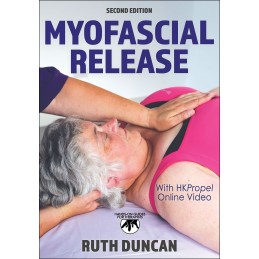Myofascial Release, Second Edition With HKPropel Online Video, offers a dynamic approach to fascial and soft tissue work suitable for all students embarking on a career in hands-on therapy as well as for experienced therapists looking to add skills to their treatments. Ruth Duncan, an advanced myofascial release therapist, proprietor, instructor, lecturer, national committee member and John F. Barnes protégé, shares her expertise to offer in-depth descriptions of myofascial techniques and their applications.
This scientifically grounded approach presents an overview of the entire fascial matrix, the three-dimensional web of tissue that supports every other structure in the body. The explanation of the anatomy and function of the connective tissue system gives practitioners the solid background needed to treat muscle injury, immobility, and pain. The book also outlines how myofascial release relates to other massage modalities, allowing therapists to incorporate a range of treatments.
Descriptions of over 60 myofascial techniques contain details on the timing, direction, and hold of each stretch as well as numerous photographs that illustrate the body and hand positions of each technique. Nuanced explanations of the unique feel of soft tissue help the therapist enhance their palpation skills. The therapist learns how to apply the best approach (cross-hand releases, longitudinal plane releases, compression releases and transverse plane releases) on specific injuries or issues. A new chapter on scar tissue details how practitioners can relieve the pain and tension common in surgical and other types of scars. The text also contains home programs that clients can use themselves between treatment sessions.
Myofascial Release, Second Edition, includes special features that make this resource more effective for readers::
- Full-color photos present a strong visual guide to employing each technique safely.
- The photo index quickly points readers to the desired technique.
- Tips provide practical comments on applying the techniques.
- Client Talk boxes share the authors experiences and insights on common situations.
- Quick Questions at the end of each chapter test readers knowledge of material.
- More than 20 online videos showcase visual demonstrations to help the reader learn the techniques more quickly and accurately.
Finally, the text offers insight on interacting with clients. It covers the client consultation process, how to check for contraindications and perform the visual assessment, how the client may respond to the treatment, and what the practitioner and client might feel and see during the process. Readers will conclude
Myofascial Release, Second Edition, with a holistic understanding of the approach and how to apply the principles to their practice.
Note:: A code for accessing HK
Propel online video is included with all new print books.


 Dostawa
Dostawa
 Płatność
Płatność
 Zwroty
Zwroty
